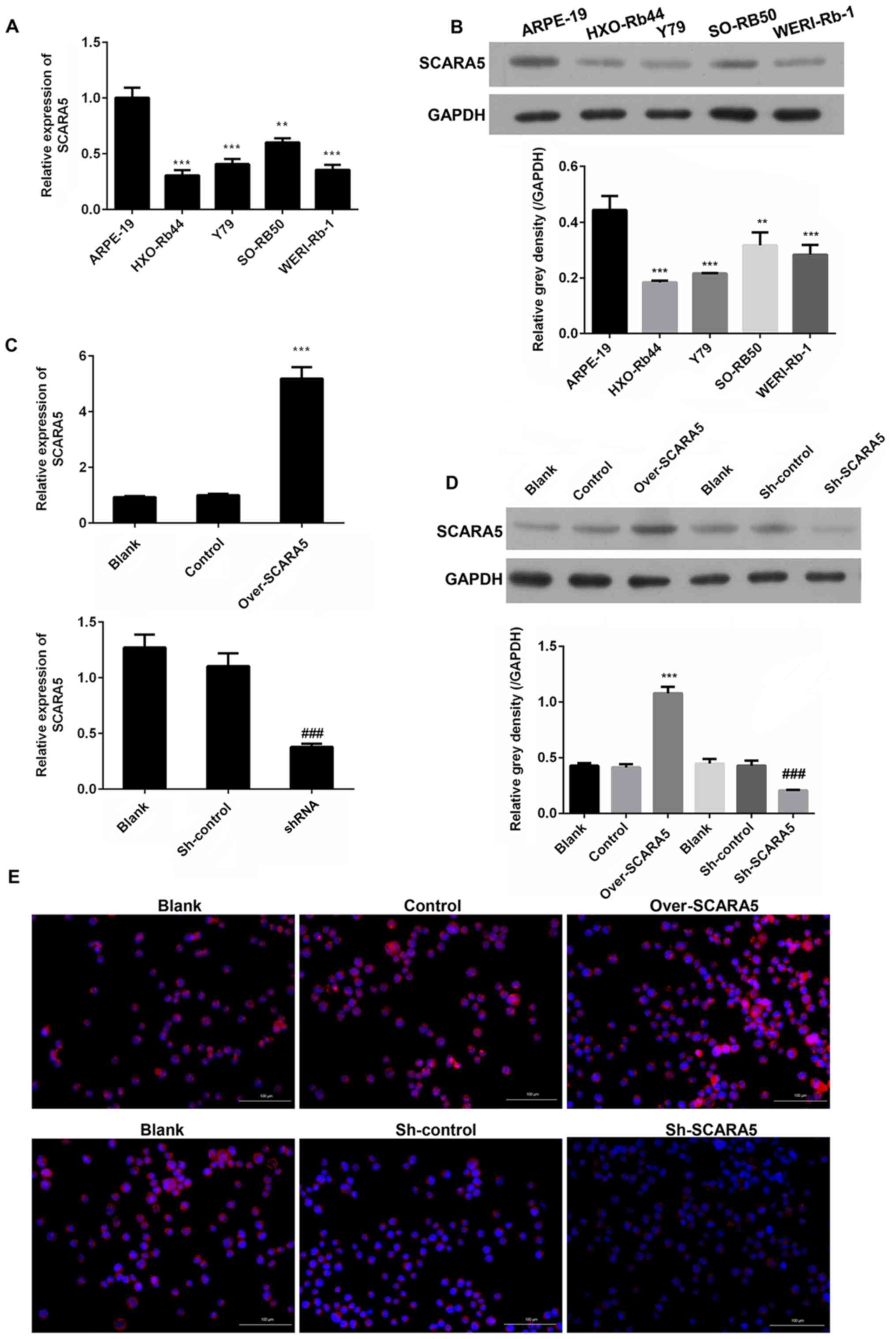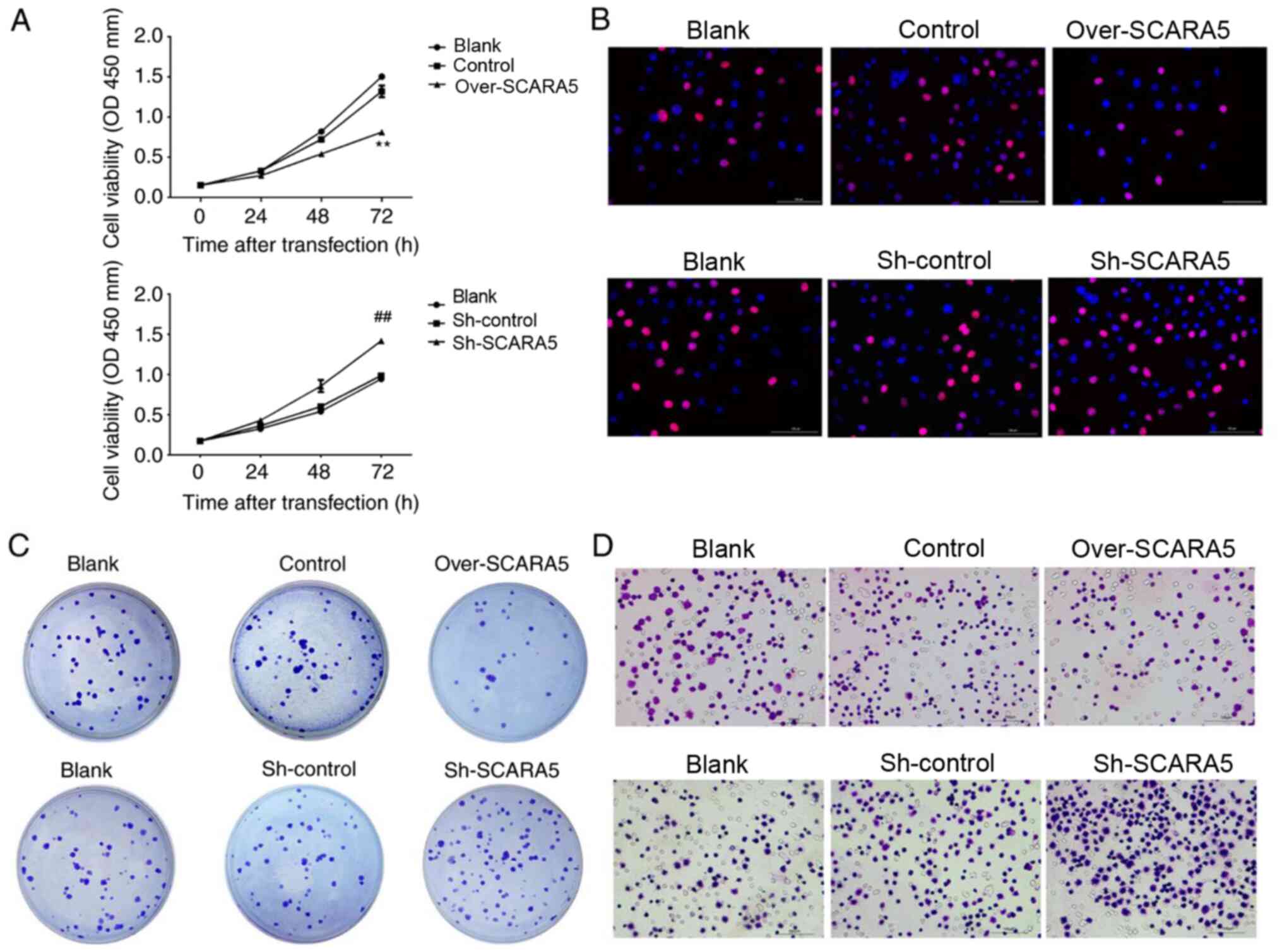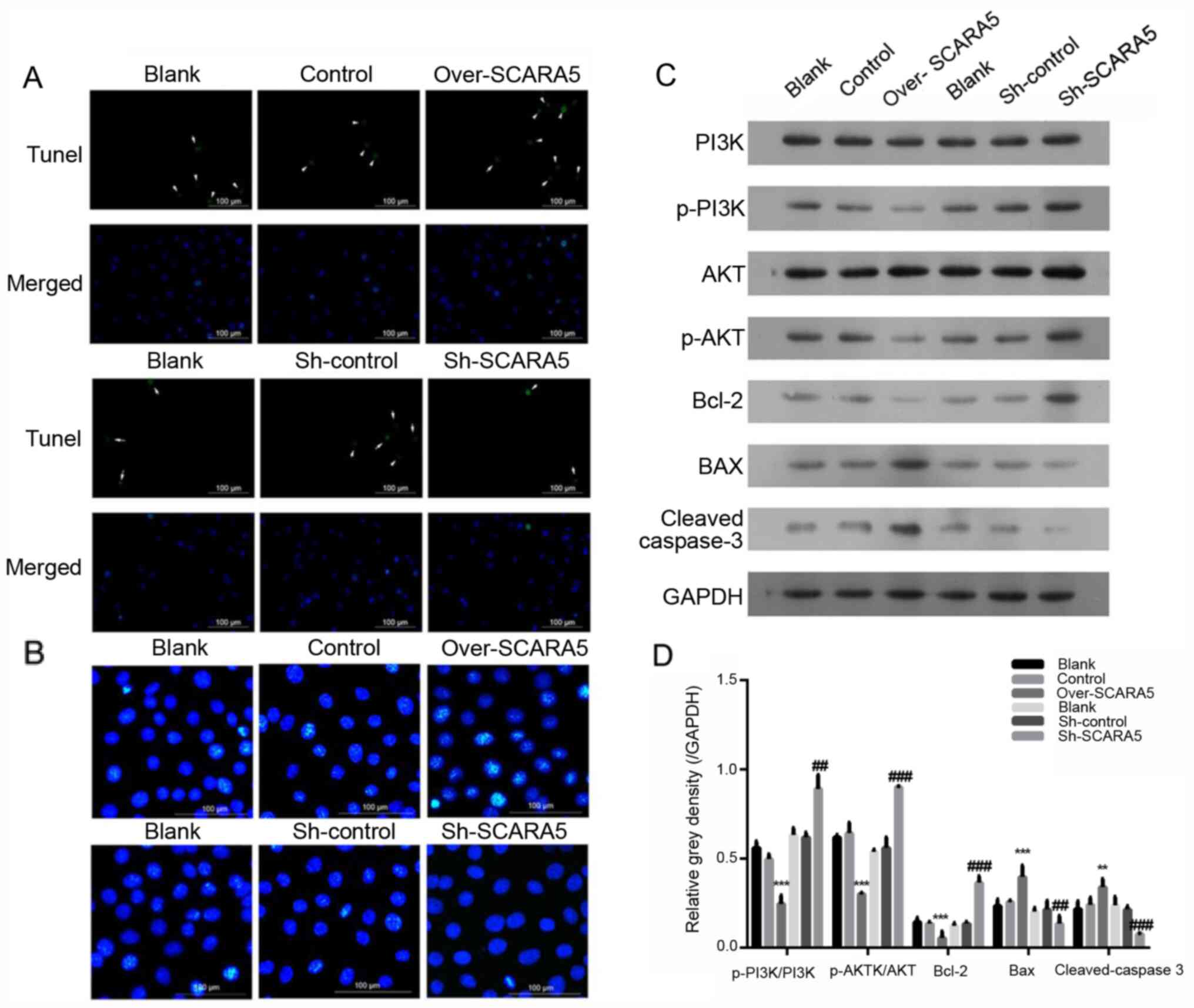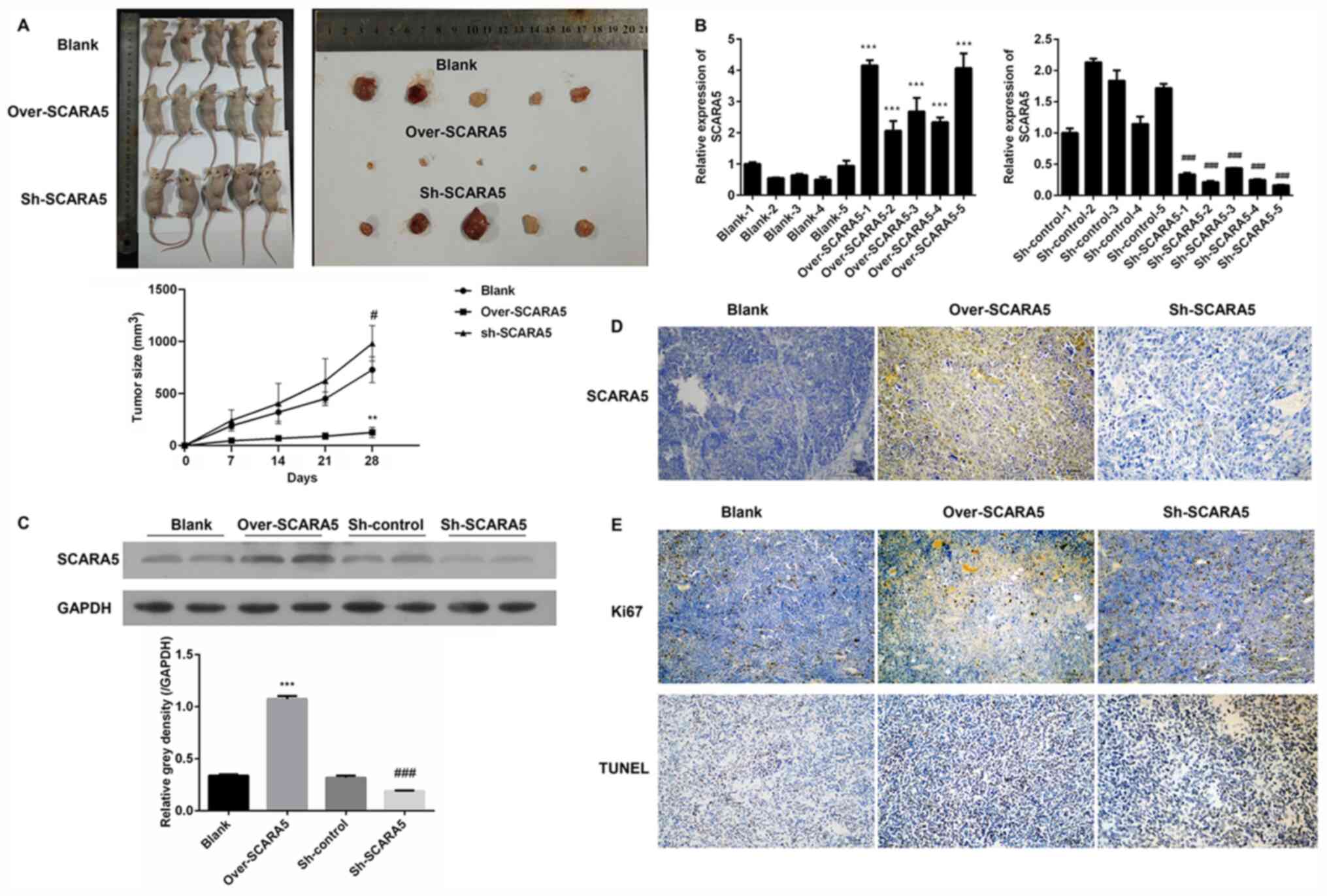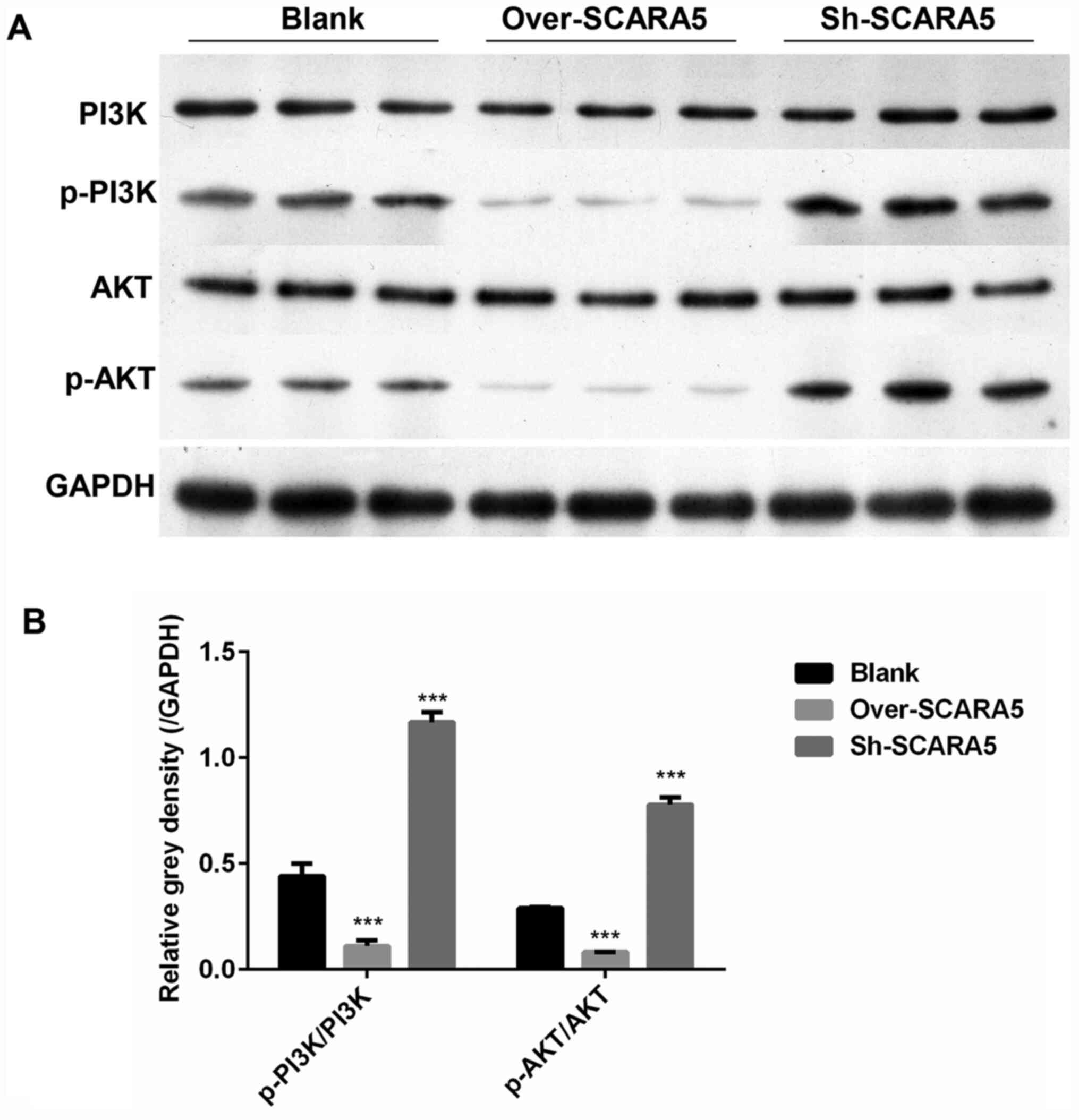|
1
|
Gao Y and Lu X: Decreased expression of
MEG3 contributes to retinoblastoma progression and affects
retinoblastoma cell growth by regulating the activity of
Wnt/β-catenin pathway. Tumour Biol. 37:1461–1469. 2016. View Article : Google Scholar : PubMed/NCBI
|
|
2
|
Chantada G and Schaiquevich P: Management
of retinoblastoma in children: Current status. Paediatr Drugs.
17:185–198. 2015. View Article : Google Scholar : PubMed/NCBI
|
|
3
|
Zhou D, Liu P, Sun DW, Chen ZJ, Hu J, Peng
SM and Liu YL: USP22 down-regulation facilitates human
retinoblastoma cell aging and apoptosis via inhibiting TERT/P53
pathway. Eur Rev Med Pharmacol Sci. 21:2785–2792. 2017.PubMed/NCBI
|
|
4
|
Yang Q, Tripathy A, Yu W, Eberhart CG and
Asnaghi L: Hypoxia inhibits growth, proliferation, and increases
response to chemotherapy in retinoblastoma cells. Exp Eye Res.
162:48–61. 2017. View Article : Google Scholar : PubMed/NCBI
|
|
5
|
Shields CL and Shields JA: Retinoblastoma
management: Advances in enucleation, intravenous chemoreduction,
and intra-arterial chemotherapy. Curr Opin Ophthalmol. 21:203–212.
2010. View Article : Google Scholar : PubMed/NCBI
|
|
6
|
Shields CL and Shields JA: Basic
understanding of current classification and management of
retinoblastoma. Curr Opin Ophthalmol. 17:228–234. 2006. View Article : Google Scholar : PubMed/NCBI
|
|
7
|
Jabbour P, Chalouhi N, Tjoumakaris S,
Gonzalez LF, Dumont AS, Chitale R, Rosenwasser R, Bianciotto CG and
Shields C: Pearls and pitfalls of intraarterial chemotherapy for
retinoblastoma. J Neurosurg Pediatr. 10:175–181. 2012. View Article : Google Scholar : PubMed/NCBI
|
|
8
|
Zhang H, Zhong J, Bian Z, Fang X, Peng Y
and Hu Y: Long non-coding RNA CCAT1 promotes human retinoblastoma
SO-RB50 and Y79 cells through negative regulation of miR-218-5p.
Biomed Pharmacother. 87:683–691. 2017. View Article : Google Scholar : PubMed/NCBI
|
|
9
|
Lin P and O'Brien JM: Frontiers in the
management of retinoblastoma. Am J Ophthalmol. 148:192–198. 2009.
View Article : Google Scholar : PubMed/NCBI
|
|
10
|
Peiser L and Gordon S: The function of
scavenger receptors expressed by macrophages and their role in the
regulation of inflammation. Microbes Infect. 3:149–159. 2001.
View Article : Google Scholar : PubMed/NCBI
|
|
11
|
Jiang Y, Oliver P, Davies KE and Platt N:
Identification and characterization of murine SCARA5, a novel class
A scavenger receptor that is expressed by populations of epithelial
cells. J Biol Chem. 281:11834–11845. 2006. View Article : Google Scholar : PubMed/NCBI
|
|
12
|
Liu J, Hu G, Chen D, Gong AY, Soori GS,
Dobleman TJ and Chen XM: Suppression of SCARA5 by Snail1 is
essential for EMT-associated cell migration of A549 cells.
Oncogenesis. 2:e732013. View Article : Google Scholar : PubMed/NCBI
|
|
13
|
Huang J, Zheng DL, Qin FS, Cheng N, Chen
H, Wan BB, Wang YP, Xiao HS and Han ZG: Genetic and epigenetic
silencing of SCARA5 may contribute to human hepatocellular
carcinoma by activating FAK signaling. J Clin Invest. 120:223–241.
2010. View
Article : Google Scholar : PubMed/NCBI
|
|
14
|
Xu Z, Hong Z, Ma M, Liu X, Chen L, Zheng
C, Xi X and Shao J: Rock2 promotes RCC proliferation by decreasing
SCARA5 expression through β-catenin/TCF4 signaling. Biochem Biophys
Res Commun. 480:586–593. 2016. View Article : Google Scholar : PubMed/NCBI
|
|
15
|
Yan N, Zhang S, Yang Y, Cheng L, Li C, Dai
L, Dai L, Zhang X, Fan P, Tian H, et al: Therapeutic upregulation
of Class A scavenger receptor member 5 inhibits tumor growth and
metastasis. Cancer Sci. 103:1631–1639. 2012. View Article : Google Scholar : PubMed/NCBI
|
|
16
|
Liu H, Hu J, Wei R, Zhou L, Pan H, Zhu H,
Huang M, Luo J and Xu W: SPAG5 promotes hepatocellular carcinoma
progression by downregulating SCARA5 through modifying β-catenin
degradation. J Exp Clin Cancer Res. 37:2292018. View Article : Google Scholar : PubMed/NCBI
|
|
17
|
Livak KJ and Schmittgen TD: Analysis of
relative gene expression data using real-time quantitative PCR and
the 2(−Delta Delta C(T)) method. Methods. 25:402–408. 2001.
View Article : Google Scholar : PubMed/NCBI
|
|
18
|
Onishi T, Matsuda S, Nakamura Y, Kuramoto
J, Tsuruma A, Sakamoto S, Suzuki S, Fuchimoto D, Onishi A, Chikaki
S, et al: Magnetically promoted rapid immunofluorescence staining
for frozen tissue sections. J Histochem Cytochem. 67:575–587. 2019.
View Article : Google Scholar : PubMed/NCBI
|
|
19
|
Thayanithy V, O'Hare P, Wong P, Zhao X,
Steer CJ, Subramanian S and Lou E: A transwell assay that excludes
exosomes for assessment of tunneling nanotube-mediated
intercellular communication. Cell Commun Signal. 15:462017.
View Article : Google Scholar : PubMed/NCBI
|
|
20
|
Hawkins P, Playle L, Golledge H, Leach M,
Banzett R, Coenen A, Cooper J, Danneman P, Flecknell R, Kirkden R,
et al: Newcastle consensus meeting on carbon dioxide euthanasia of
laboratory animals. 1–17. 2006.
|
|
21
|
National Research Council (US) Committee
for the Update of the Guide for the Care and Use of Laboratory
Animals, . Guide for the Care and Use of Laboratory Animals. 8th
ed. National Academies Press (US); Washington (DC): 2011
|
|
22
|
Martini M, De Santis MC, Braccini L,
Gulluni F and Hirsch E: PI3K/AKT signaling pathway and cancer: An
updated review. Ann Med. 46:372–383. 2014. View Article : Google Scholar : PubMed/NCBI
|
|
23
|
Ancona-Lezama D, Dalvin LA and Shields CL:
Modern treatment of retinoblastoma: A 2020 review. Indian J
Ophthalmol. 68:2356–2365. 2020. View Article : Google Scholar : PubMed/NCBI
|
|
24
|
Rossukon K and Duangnate R:
Retinoblastoma: Etiology, modeling, and treatment. Cancers (Basel).
12:23042020. View Article : Google Scholar
|
|
25
|
Sweid A, El Naamani K, Sajja KC, Hammoud
B, Knapp MD, Moylan DD, Joffe D, Morse CE, Habbal D, Weinberg JH,
et al: Incidence and predictors of ophthalmic artery occlusion in
intra-arterial chemotherapy for retinoblastoma. J Neurointerv Surg.
doi: http://dx.doi.org/10.1136/neurintsurg-2020-016759.
|
|
26
|
Chao H and Walsh CE: RNA repair for
haemophilia A. Expert Rev Mol Med. 8:1–8. 2006. View Article : Google Scholar : PubMed/NCBI
|
|
27
|
Pluddemann A, Neyen C and Gordon S:
Macrophage scavenger receptors and host-derived ligands. Methods.
43:207–217. 2007. View Article : Google Scholar : PubMed/NCBI
|
|
28
|
Peiser L, Mukhopadhyay S and Gordon S:
Scavenger receptors in innate immunity. Curr Opin Immunol.
14:123–128. 2002. View Article : Google Scholar : PubMed/NCBI
|
|
29
|
Areschoug T and Gordon S: Scavenger
receptors: Role in innate immunity and microbial pathogenesis. Cell
Microbiol. 11:1160–1169. 2009. View Article : Google Scholar : PubMed/NCBI
|
|
30
|
Li JY, Paragas N, Ned RM, Qiu A, Viltard
M, Leete T, Drexler IR, Chen X, Sanna-Cherchi S, Mohammed F, et al:
Scara5 is a ferritin receptor mediating non-transferrin iron
delivery. Dev Cell. 16:35–46. 2009. View Article : Google Scholar : PubMed/NCBI
|
|
31
|
Lee H, Lee YJ, Choi H, Seok JW, Yoon BK,
Kim D, Han JY, Lee Y, Kim HJ and Kim JW: SCARA5 plays a critical
role in the commitment of mesenchymal stem cells to adipogenesis.
Sci Rep. 7:148332017. View Article : Google Scholar : PubMed/NCBI
|
|
32
|
De la Fuente IM and Lopez JI: Cell
motility and cancer. Cancers (Basel). 12:21772020. View Article : Google Scholar
|
|
33
|
Kashyap S, Singh L, Kumar N, Singh MK,
Pushker N, Bakhshi S, Sen S, Lomi N, Meel R and Chawla B: Combined
association of massive choroidal and optic nerve invasion as a
prognostic relevance in primary retinoblastoma: A 10-year study.
Asia Pac J Clin Oncol. 2020.(Epub ahead of print). View Article : Google Scholar : PubMed/NCBI
|
|
34
|
Bock AJ, Nymoen DA, Brenne K, Kaern J and
Davidson B: SCARA3 mRNA is overexpressed in ovarian carcinoma
compared with breast carcinoma effusions. Hum Pathol. 43:669–674.
2012. View Article : Google Scholar : PubMed/NCBI
|
|
35
|
Cao Y, Xia F, Wang P and Gao M:
MicroRNA935p promotes the progression of human retinoblastoma by
regulating the PTEN/PI3K/AKT signaling pathway. Mol Med Rep.
18:5807–5814. 2018.PubMed/NCBI
|
|
36
|
Fransecky L, Mochmann LH and Baldus CD:
Outlook on PI3K/AKT/mTOR inhibition in acute leukemia. Mol Cell
Ther. 3:22015. View Article : Google Scholar : PubMed/NCBI
|
|
37
|
Faes S and Dormond O: PI3K and AKT:
Unfaithful partners in cancer. Int J Mol Sci. 16:21138–21152. 2015.
View Article : Google Scholar : PubMed/NCBI
|
|
38
|
Follo MY, Manzoli L, Poli A, McCubrey JA
and Cocco L: PLC and PI3K/Akt/mTOR signalling in disease and
cancer. Adv Biol Regul. 57:10–16. 2015. View Article : Google Scholar : PubMed/NCBI
|
|
39
|
Ferenc P, Solar P, Kleban J, Mikes J and
Fedorocko P: Down-regulation of Bcl-2 and Akt induced by
combination of photoactivated hypericin and genistein in human
breast cancer cells. J Photochem Photobiol B. 98:25–34. 2010.
View Article : Google Scholar : PubMed/NCBI
|
|
40
|
Wu S, Ai N, Liu Q and Zhang J: MicroRNA448
inhibits the progression of retinoblastoma by directly targeting
ROCK1 and regulating PI3K/AKT signalling pathway. Oncol Rep.
39:2402–2412. 2018.PubMed/NCBI
|
|
41
|
Xie C, Freeman MJ, Lu H, Wang X, Forster
CL, Sarver AL and Hallstrom TC: Retinoblastoma cells activate the
AKT pathway and are vulnerable to the PI3K/mTOR inhibitor
NVP-BEZ235. Oncotarget. 8:38084–38098. 2017. View Article : Google Scholar : PubMed/NCBI
|
|
42
|
Meng B, Ii H, Qu W and Yuan H: Anticancer
effects of gingerol in retinoblastoma cancer cells (RB355 Cell
Line) are mediated via apoptosis induction, cell cycle arrest and
upregulation of PI3K/Akt signaling pathway. Med Sci Monit.
24:1980–1987. 2018. View Article : Google Scholar : PubMed/NCBI
|















